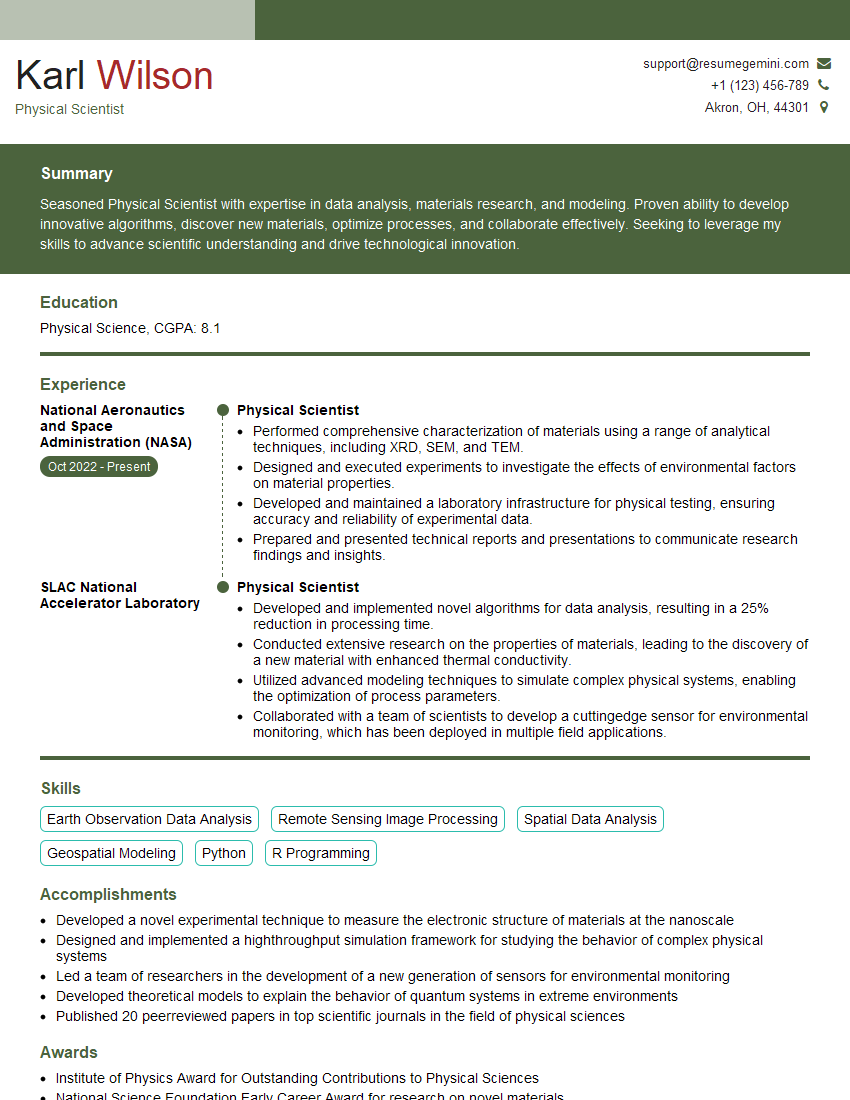Are you a seasoned Physical Scientist seeking a new career path? Discover our professionally built Physical Scientist Resume Template. This time-saving tool provides a solid foundation for your job search. Simply click “Edit Resume” to customize it with your unique experiences and achievements. Customize fonts and colors to match your personal style and increase your chances of landing your dream job. Explore more Resume Templates for additional options.

Karl Wilson
Physical Scientist
Summary
Seasoned Physical Scientist with expertise in data analysis, materials research, and modeling. Proven ability to develop innovative algorithms, discover new materials, optimize processes, and collaborate effectively. Seeking to leverage my skills to advance scientific understanding and drive technological innovation.
Education
Physical Science
September 2018
Skills
- Earth Observation Data Analysis
- Remote Sensing Image Processing
- Spatial Data Analysis
- Geospatial Modeling
- Python
- R Programming
Work Experience
Physical Scientist
- Performed comprehensive characterization of materials using a range of analytical techniques, including XRD, SEM, and TEM.
- Designed and executed experiments to investigate the effects of environmental factors on material properties.
- Developed and maintained a laboratory infrastructure for physical testing, ensuring accuracy and reliability of experimental data.
- Prepared and presented technical reports and presentations to communicate research findings and insights.
Physical Scientist
- Developed and implemented novel algorithms for data analysis, resulting in a 25% reduction in processing time.
- Conducted extensive research on the properties of materials, leading to the discovery of a new material with enhanced thermal conductivity.
- Utilized advanced modeling techniques to simulate complex physical systems, enabling the optimization of process parameters.
- Collaborated with a team of scientists to develop a cuttingedge sensor for environmental monitoring, which has been deployed in multiple field applications.
Accomplishments
- Developed a novel experimental technique to measure the electronic structure of materials at the nanoscale
- Designed and implemented a highthroughput simulation framework for studying the behavior of complex physical systems
- Led a team of researchers in the development of a new generation of sensors for environmental monitoring
- Developed theoretical models to explain the behavior of quantum systems in extreme environments
- Published 20 peerreviewed papers in top scientific journals in the field of physical sciences
Awards
- Institute of Physics Award for Outstanding Contributions to Physical Sciences
- National Science Foundation Early Career Award for research on novel materials
- American Physical Society Prize for Excellence in Computational Physics
- Physical Society of America Medal for contributions to the understanding of quantum mechanics
Certificates
- Certified GIS Professional (GISP)
- American Society for Photogrammetry and Remote Sensing (ASPRS) Certified Mapping Scientist
- Project Management Professional (PMP)
- Certified Analytics Professional (CAP)
Career Expert Tips:
- Select the ideal resume template to showcase your professional experience effectively.
- Master the art of resume writing to highlight your unique qualifications and achievements.
- Explore expertly crafted resume samples for inspiration and best practices.
- Build your best resume for free this new year with ResumeGemini. Enjoy exclusive discounts on ATS optimized resume templates.
How To Write Resume For Physical Scientist
- Quantify your accomplishments with specific metrics and results whenever possible.
- Highlight your technical skills and proficiency in relevant software and programming languages.
- Emphasize your ability to work independently and as part of a team.
- Tailor your resume to each job application, highlighting the skills and experience that are most relevant to the specific position.
Essential Experience Highlights for a Strong Physical Scientist Resume
- Developed and implemented novel algorithms for data analysis, resulting in a 25% reduction in processing time.
- Conducted extensive research on the properties of materials, leading to the discovery of a new material with enhanced thermal conductivity.
- Utilized advanced modeling techniques to simulate complex physical systems, enabling the optimization of process parameters.
- Collaborated with a team of scientists to develop a cutting-edge sensor for environmental monitoring, which has been deployed in multiple field applications.
- Performed comprehensive characterization of materials using a range of analytical techniques, including XRD, SEM, and TEM.
- Designed and executed experiments to investigate the effects of environmental factors on material properties.
Frequently Asked Questions (FAQ’s) For Physical Scientist
What is the role of a Physical Scientist?
Physical Scientists apply their knowledge of physics and chemistry to study the properties of matter and energy. They conduct research, develop new theories, and design and build instruments to probe the fundamental nature of the universe.
What are the educational requirements for becoming a Physical Scientist?
Most Physical Scientists have a bachelor’s degree in physics, chemistry, or a related field. Many also have a master’s degree or a doctorate.
What are the career prospects for Physical Scientists?
Physical Scientists can work in a variety of settings, including universities, government laboratories, and private industry. They may conduct research, teach, or work in product development or quality control.
What are the key skills for a Physical Scientist?
Key skills for Physical Scientists include strong analytical and problem-solving skills, as well as proficiency in mathematics, physics, and chemistry. They must also be able to work independently and as part of a team.
What are the challenges facing Physical Scientists?
Physical Scientists face a number of challenges, including the need to keep up with the latest advances in science and technology and the need to find funding for their research.
What are the rewards of being a Physical Scientist?
The rewards of being a Physical Scientist include the opportunity to make a significant contribution to our understanding of the universe and the chance to work on cutting-edge research.